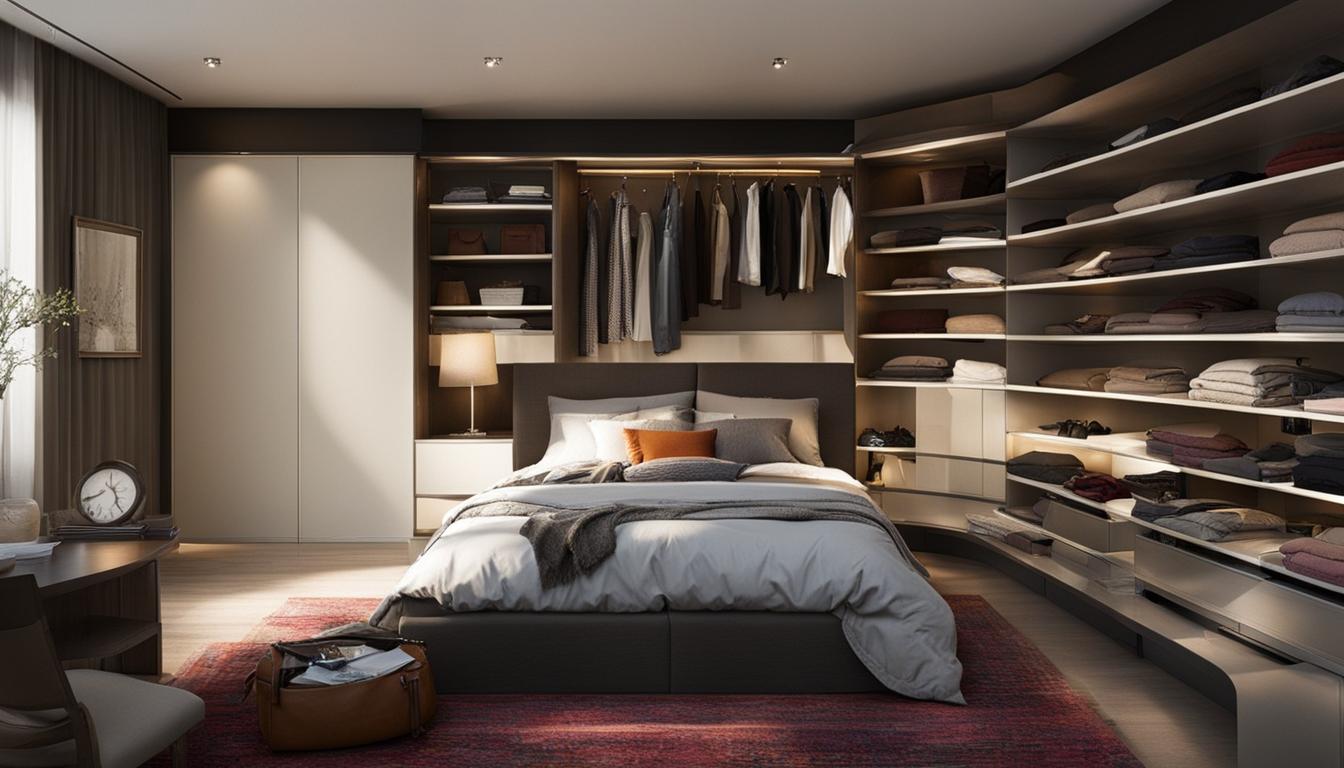Have you ever felt uneasy or restless in your bedroom, even after a good night’s rest? Your bedroom may be suffering from bad Feng Shui. Feng Shui is the ancient Chinese practice of arranging the environment to achieve balance and harmony. In the context of a bedroom, it involves optimizing the space and its energy flow to promote restful sleep and relaxation.
In this section, we will explore the concept of Feng Shui and how it applies to bedroom spaces. We will delve into the factors that contribute to bad Feng Shui in bedrooms and provide insights on how to transform your room into a more harmonious and peaceful environment.
Key Takeaways:
- Understanding Feng Shui principles is crucial for creating a harmonious bedroom environment.
- Factors such as clutter, improper lighting, and negative symbolism can contribute to bad Feng Shui in bedrooms.
- Transforming your bedroom into a more harmonious and peaceful environment requires practical design and decor choices that promote balance and positive energy flow.
Understanding Feng Shui Principles for Bedroom Design
Creating a Feng Shui bedroom requires attention to detail and an understanding of the fundamental principles of this ancient art. By adopting the right mindset and following Feng Shui bedroom tips, you can design a space that promotes harmony, relaxation, and rejuvenation. Here are some essential considerations when it comes to Feng Shui bedroom layout:
The Importance of Bed Placement
When it comes to optimizing the energy flow in your bedroom, bed placement is crucial. According to Feng Shui principles, the placement of your bed can impact your emotional and physical well-being. To enhance positive energy flow, it’s essential to position your bed so that it has a clear view of the door while being far enough away to allow ample space for movement around it. Ideally, your bed should also be placed diagonally from the door to create a sense of balance.
Proper Furniture Arrangement
Furniture placement is another critical aspect to consider. Your bed should be the focal point of the room, with sufficient space around it to move freely. Nightstands should be placed on either side of the bed to evoke a sense of symmetry and balance. When arranging other furniture, ensure that it does not block any natural light sources or impede movement throughout the room.
Creating a Balanced Atmosphere
Balancing the elements in your bedroom is a central concept in Feng Shui. The five elements – wood, fire, earth, metal, and water – should be represented in a harmonious and balanced way within the room. To achieve this, incorporate wood through flooring or furniture, fire through lighting or candles, earth through natural textiles or ceramics, metal through mirrors or metallic accents, and water through artwork depicting a water scene or actual water features, such as a small fountain.
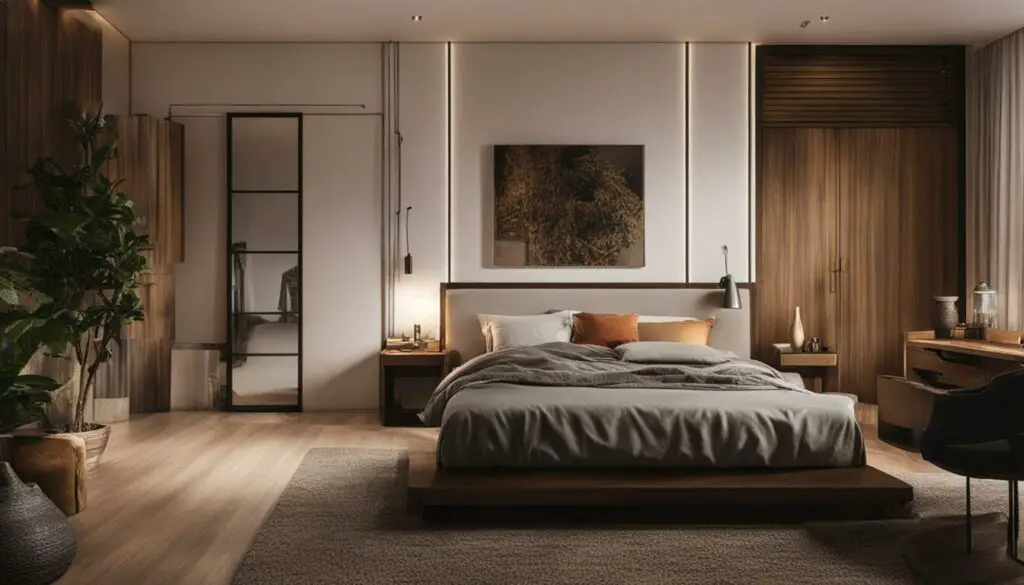
By following these Feng Shui bedroom tips and principles, you can create a peaceful and harmonious space that promotes rest, relaxation, and well-being.
Choosing the Right Colors for a Harmonious Bedroom
The colors you choose for your bedroom can have a significant impact on the overall Feng Shui of the space. Certain colors, such as blues and greens, promote calmness and relaxation, while others, like reds and oranges, stimulate energy and passion. It’s essential to select colors that align with your personal preferences and the energy you want to cultivate in your bedroom.
When it comes to Feng Shui, there are specific colors that are believed to enhance positive energy flow and promote restful sleep.
| Color | Element | Meaning |
|---|---|---|
| Blue | Water | Calmness, relaxation, clarity |
| Green | Wood | Growth, renewal, harmony |
| Pink | Fire | Love, compassion, warmth |
| Purple | Fire | Spirituality, luxury, wealth |
| White | Metal | Cleanliness, purity, clarity |
These colors can be used as accents or as the primary color scheme for your bedroom. Additionally, neutral colors like beige and gray can create a calming atmosphere and serve as a foundation for other accents.
It’s important to note that every individual has their own unique energy and preferences. Therefore, it’s essential to select colors that resonate with you and bring you a sense of peace and tranquility.

Incorporating Feng Shui Decor in Your Bedroom
Your bedroom decor plays a crucial role in creating a harmonious and balanced environment that promotes restful sleep and relaxation. In Feng Shui, proper decor can enhance the flow of positive energy and create a sense of tranquility. Let’s explore some effective ways to incorporate Feng Shui decor in your bedroom:
1. Soothing Artwork
Artwork can have a significant impact on the energy of your bedroom. Choosing calming and soothing artwork, such as nature scenes or abstract paintings with soft colors, can create a peaceful atmosphere. Avoid artwork that depicts violent or aggressive scenes as they can disrupt the flow of positive energy.
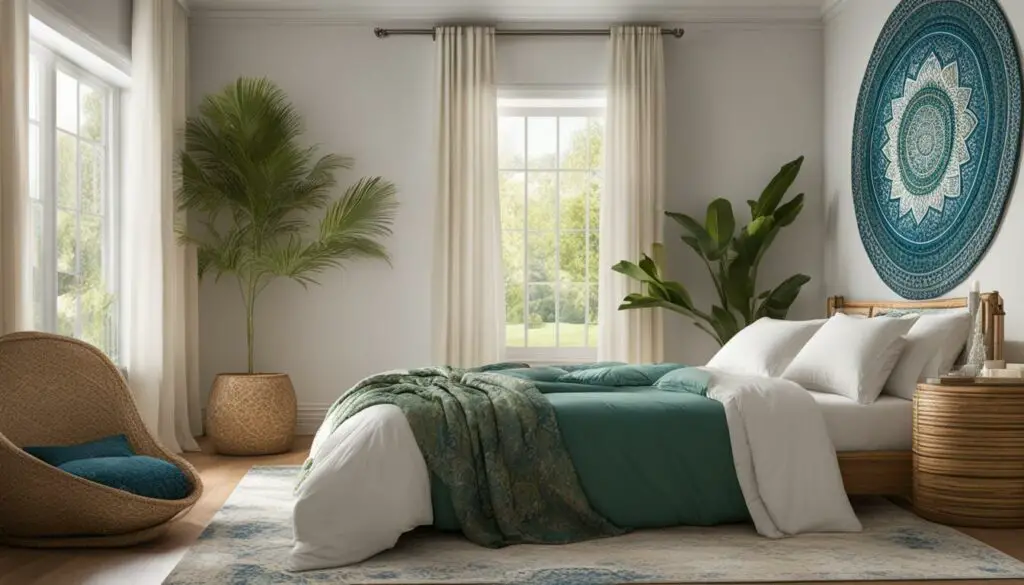
2. Proper Lighting
Lighting plays a vital role in Feng Shui decor. Too much light can create an overly stimulating environment, while insufficient light can contribute to feelings of depression and lethargy. Natural light is ideal for bedrooms, but if that’s not possible, opt for warm and soft lighting instead of harsh overhead lights.
3. Clutter-Free Space
A cluttered bedroom can hinder the flow of energy and contribute to feelings of stress and anxiety. Keep your bedroom neat and organized by minimizing the number of items you have on display. Consider hidden storage solutions, such as under-bed storage or closed wardrobes, to maintain a clean and harmonious space.
4. Natural Materials
Using natural materials in your bedroom decor can enhance the natural flow of energy. Opt for materials such as wood, bamboo, and cotton for your bedding and furniture, and avoid synthetic materials. Incorporating plants is another way to introduce natural elements into your bedroom.
5. Meaningful Decor
Choose decor that has personal meaning to you, such as family photos or sentimental items. This can help create a sense of comfort and positivity in your bedroom. However, avoid displaying too many personal items as they can contribute to clutter and disrupt the flow of energy.
By incorporating these Feng Shui decor tips, you can create a peaceful and harmonious environment that promotes restful sleep and relaxation.
Optimizing Furniture Placement in Your Bedroom
The right furniture placement is crucial for achieving good Feng Shui in your bedroom. It can enhance energy flow, improve relaxation and promote better sleep. In this section, we will provide some guidance on how to arrange your bedroom furniture for optimal Feng Shui.
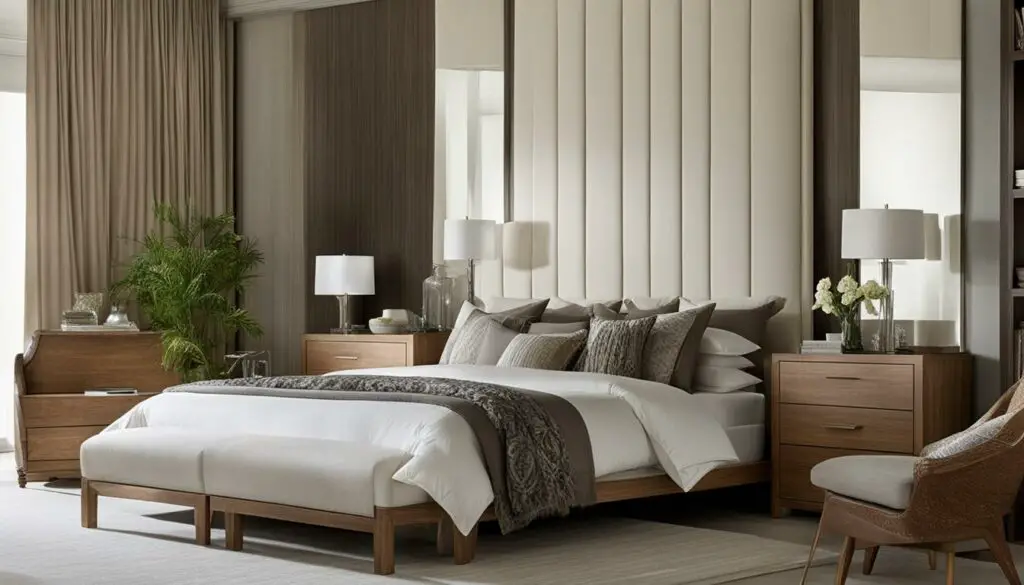
First, it’s important to note that the bed should always have a commanding position in the room. This means that the headboard should be against a solid wall, facing the door, but not directly in line with it. If your bed cannot face the door, use a mirror to reflect the entrance. This allows you to see anyone entering the room while lying in bed, providing a sense of security and control.
Next, consider the placement of other furniture in the room. Avoid cluttering the space with too much furniture, which can disrupt energy flow and create a sense of chaos. Ensure that there is ample space around the bed for ease of movement and to promote a feeling of openness and relaxation.
If possible, place a nightstand on each side of the bed to promote balance and symmetry. Make sure they are of equal height and have matching lamps. This will create a sense of harmony and balance, which is essential for good Feng Shui.
When placing dressers or other storage units, avoid positioning them directly across from the bed, as this can create a sense of tension and anxiety. Instead, try to position them at an angle to the bed or against a wall.
Summary
Proper furniture placement is key to achieving optimal Feng Shui in your bedroom. Arrange your bed in a commanding position facing the door, but not in line with it. Minimize clutter and ensure ample space around the bed, promoting a sense of openness and relaxation. Add nightstands on each side of the bed for balance and symmetry, and avoid positioning storage units directly across from the bed to reduce tension and anxiety.
Harnessing the Power of Plants in Your Bedroom
Plants are a simple and effective way to enhance the Feng Shui of your bedroom. They not only add beauty and freshness to your space but also purify the air and create positive energy. However, when it comes to bedroom plants, it is essential to choose the right ones based on their energy and characteristics.
The following are some of the best Feng Shui bedroom plants:
| Plant | Description | Benefits |
|---|---|---|
| Snake Plant | A tall, sturdy plant with variegated leaves | Improves air quality, purifies the environment, and promotes good sleep |
| Lavender | A fragrant flowering herb with purple blooms | Reduces anxiety and stress, promotes relaxation and better sleep |
| Bamboo Palm | A tropical plant with lush green fronds | Removes harmful toxins, purifies the air, and promotes peace and tranquility |
| Peace Lily | A low-maintenance plant with glossy, green leaves and white blooms | Filters toxins from the air, enhances the energy flow, and promotes relaxation |
When it comes to placement, it is crucial to avoid cluttering your space with too many plants. Instead, choose one or two that fit your room size and decor style. Place them in areas where they can receive enough natural light but not direct sunlight. Avoid placing plants near your bed or in corners, as they can create stagnant energy and hamper your sleep quality.
By incorporating these Feng Shui bedroom plants, you can create a vibrant and healthy environment that promotes restful sleep, relaxation, and positive energy.

Mirrors and Feng Shui in the Bedroom
Mirrors are one of the most versatile decor elements in a room, but in Feng Shui, their placement is critical, especially in the bedroom. A well-placed mirror can enhance the energy flow, create a sense of spaciousness, and reflect natural light, while a poorly placed one can cause negative effects and disturbances in the Qi energy. Here are some tips for incorporating mirrors into your Feng Shui bedroom:
Guidelines for Mirror Placement
The first rule of thumb is to avoid placing mirrors directly facing the bed, as this is believed to cause restlessness, nightmares, and even infidelity. Additionally, mirrors should not reflect clutter, sharp objects, or negative imagery, as it can amplify negative energy and disrupt the balance. Instead, position mirrors in a way that reflects peaceful images, such as nature or artwork, and in a location that maximizes natural light and promotes calmness.
Types of Mirrors
There are many shapes and sizes of mirrors, but in Feng Shui, some are more suitable for the bedroom than others. Round or oval mirrors are excellent options as they symbolize unity, harmony, and continuity. Square or rectangular mirrors are better suited for other areas of the home, as they represent solidity and stability. Additionally, choose mirrors with frames that match the aesthetic of the room and avoid mirrors that distort or break the reflection.
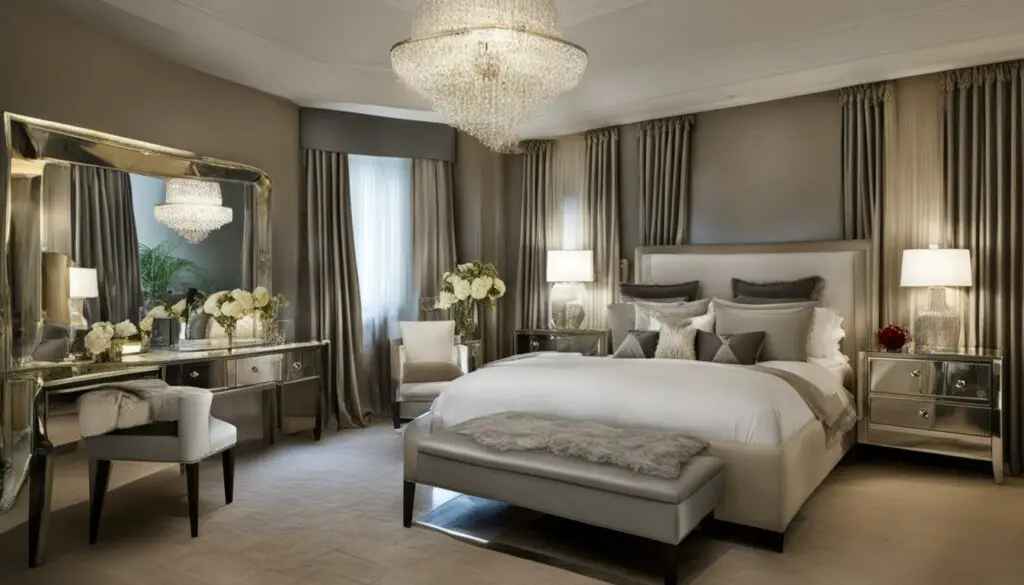
“A mirror in the bedroom creates more energy, but it also can reflect your worries and amplify problems.”
In summary, mirrors in the bedroom can be beneficial if placed thoughtfully and intentionally. Avoiding negative reflections, choosing the right type of mirror, and positioning it appropriately can improve the energy flow and create a harmonious atmosphere.
Design Tips for a Feng Shui Bedroom
Incorporating Feng Shui principles in the design of your bedroom can transform it into a tranquil and inviting sanctuary. Here are some practical tips to guide you in creating a harmonious atmosphere:
Choose the Right Colors
Colors play a crucial role in promoting positive energy flow in a bedroom. Opt for calming hues such as soft blues, greens, and lavender. Avoid bold and bright colors as they tend to create a sense of restlessness. Consider adding pops of color through artwork or decor.
Introduce Natural Materials
Natural materials like wood, bamboo, and cotton add warmth and texture to a bedroom while promoting a sense of relaxation. Avoid synthetic materials as they can disrupt the flow of energy. Consider adding a bedside table made of wood or bamboo, or draping a cotton throw over your bed.
Choose Soothing Lighting
The lighting in your bedroom should be soft and calming. Avoid harsh overhead lighting and opt for soft, warm lamps instead. Consider adding dimmer switches to adjust the lighting levels accordingly.
Add Artwork and Decor
Artwork and decor can enhance the Feng Shui of your bedroom, promoting a sense of harmony and balance. Choose pieces that inspire relaxation and joy, and avoid anything too stimulating or negative. Consider adding a soothing nature-inspired painting or a vase of fresh flowers.
Optimize Furniture Placement
The placement of furniture in your bedroom can impact the flow of energy. Avoid placing your bed directly in line with the door or under a window. Consider placing it diagonally across from the door and ensuring there is enough space to walk around it.
Minimize Clutter
Clutter disrupts the flow of energy and can create a sense of restlessness. Keep your bedroom free of unnecessary items and ensure everything has its place. Consider adding discreet storage solutions to keep your space organized.

“Your home should be a sanctuary for your soul, where you can truly relax, recharge, and rejuvenate. Incorporating Feng Shui principles into your bedroom design can transform it into a peaceful and harmonious space.”
Optimal Bed Placement for Positive Energy Flow
When it comes to bedroom Feng Shui, the placement of your bed is crucial. The goal is to achieve optimal energy flow and create a harmonious atmosphere that promotes restful sleep and relaxation. Here are some tips for bed placement:
- Position your bed as far away from the door as possible, but still allowing for a clear view of the entrance.
- Avoid placing your bed in line with the door, as this is known as the “coffin position” and can lead to restless sleep and a lack of energy.
- Place your bed against a solid wall, with a sturdy headboard for support and to symbolize a sense of stability in your life.
- Ensure there is enough space on both sides of the bed for easy access and a balanced energy flow.
- Do not place your bed under a window, as this can disrupt the energy flow and create a sense of insecurity.
By following these bed placement guidelines, you can create a more tranquil and peaceful sleeping space that promotes positive energy flow and a restful night’s sleep.
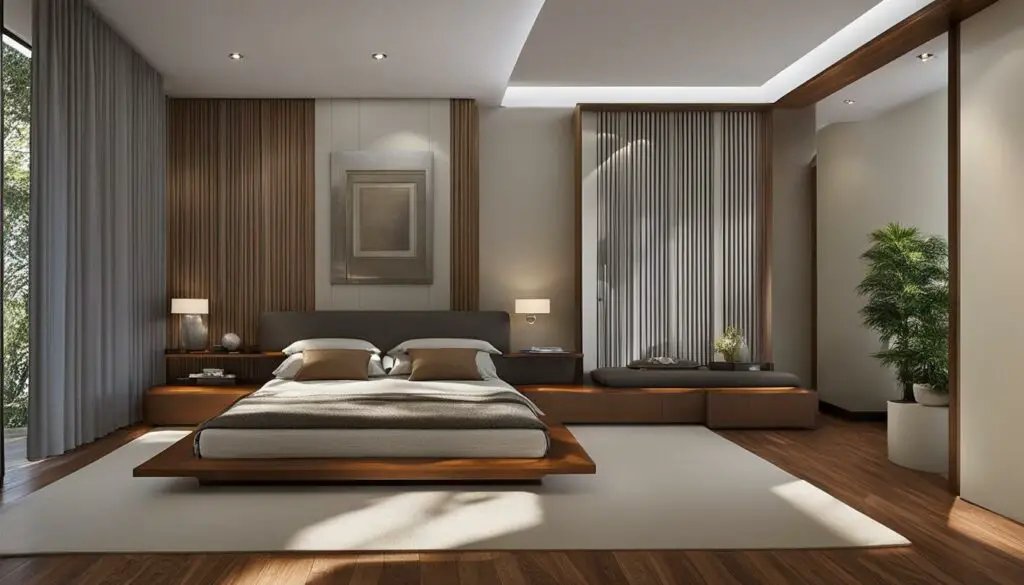
Enhancing Feng Shui with Elemental Balance
Incorporating the five elements of Feng Shui—wood, fire, earth, metal, and water—into your bedroom can promote balance and harmony. Each element has its symbolism, and by incorporating them into your space, you can enhance the energy flow and create a peaceful environment.
Wood: Introducing the wood element in your bedroom can promote growth and vitality. This element is associated with the color green and its various shades, making it an excellent choice for bedding, curtains, or decorative plants.
Fire: The fire element is associated with passion, creativity, and energy. To incorporate the fire element into your bedroom, use candles, lamps, or artwork with fiery colors such as red, orange, or pink.
Earth: Earth is associated with stability, grounding, and nourishment. Incorporate earthy tones, such as beige, brown, or yellow, into your bedding, rugs, or wall colors to create a stable and nurturing environment.
Metal: The metal element promotes clarity, precision, and efficiency. Use metal decor elements such as picture frames, lamps, or metallic accessories to introduce this element into your bedroom.
Water: Water is associated with calmness, relaxation, and rejuvenation. Introduce this element by placing a small water fountain or decorative bowl of water in your room. Blue, black, and grey colors are a perfect choice for water decor.

By incorporating the five elements of Feng Shui, you can create a balanced and harmonious bedroom space. Consider mixing and matching these elements to find the perfect balance that suits your needs and promotes positive energy flow.
Incorporating Feng Shui Principles in Small Bedrooms
If you have a small bedroom, incorporating Feng Shui principles can be challenging but not impossible. With some creativity and an open mind, you can create a harmonious and balanced space that promotes restful sleep and tranquility.
Maximizing Space
When it comes to small bedrooms, every inch counts. To optimize space, consider investing in multi-functional furniture pieces such as a bed with built-in storage or a nightstand with drawers. Additionally, avoid clutter by limiting the number of unnecessary items in your room and keeping surfaces clean and organized. By creating more physical space, you can enhance the flow of energy in your bedroom.
Color Choices
Choosing the right colors is crucial in small bedrooms as they can affect the overall perception of space. Light and neutral colors such as white, cream, and beige make the room look more spacious and airy, while darker shades such as navy or burgundy can create a cozy and intimate ambiance. It is important to strike a balance between personal preferences and Feng Shui principles.
Bed Placement
The placement of the bed in a small bedroom is critical. According to Feng Shui principles, the bed should be placed diagonally opposite the door, allowing for a clear view of the room and promoting a sense of safety. However, in a small bedroom, this might not be possible. Instead, try to position the bed against a solid wall, avoiding placing it under a window or in line with the door as it can create an unbalanced energy flow.
Mirrors and Natural Light
In small bedrooms, mirrors and natural light can be used to create a sense of spaciousness. Mirrors can reflect light and create an illusion of depth, while natural light can make the room feel brighter and more expansive. However, be mindful of where you place mirrors as they can also reflect negative energy or disrupt the harmony of the room.
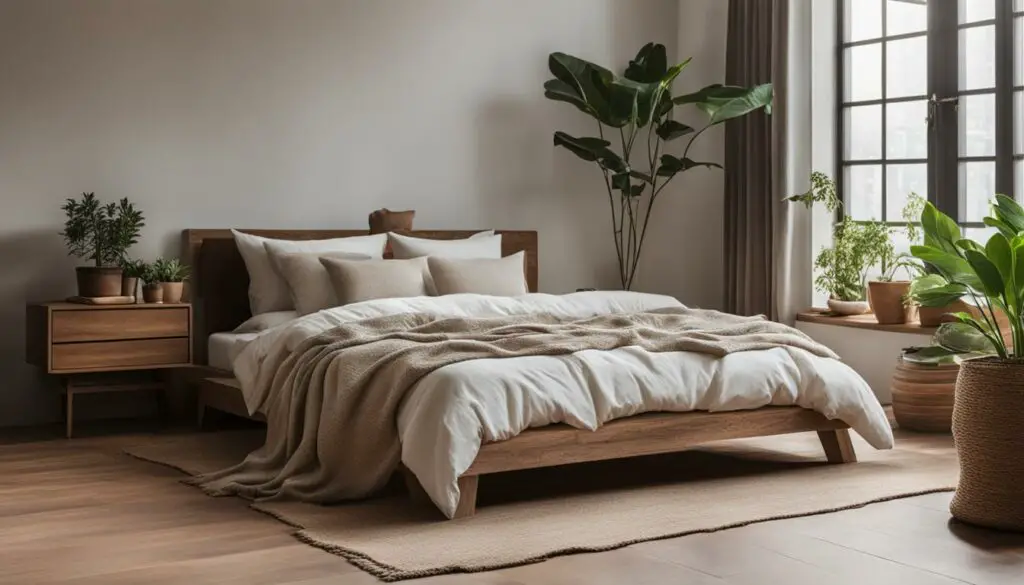
Final Thoughts
Small bedrooms can still be transformed into peaceful and harmonious spaces by incorporating Feng Shui principles. By maximizing space, choosing the right colors, and placing the bed and mirrors thoughtfully, you can create a visually appealing and balanced room that promotes positive energy flow. Remember to strike a balance between personal preferences and Feng Shui guidelines to create a space that reflects your individuality and supports your well-being.
Conclusion
By now, you should have gained a better understanding of the fundamentals of Feng Shui and how they relate to bedroom spaces. Creating a harmonious and peaceful environment in the bedroom is essential for promoting restful sleep and overall well-being.
Key Points to Remember:
- Avoid bad Feng Shui practices in the bedroom, such as clutter, sharp edges, and electronics.
- Proper furniture placement, room layout, and the flow of energy are essential principles of Feng Shui.
- Colors play a significant role in Feng Shui, and selecting the right hues can promote restful sleep and tranquility.
- Decor elements such as artwork, lighting, and plants can enhance the Feng Shui of your sleeping space.
- Bed placement, mirror placement, and elemental balance are crucial considerations for creating a harmonious bedroom environment.
- Applying Feng Shui principles to small bedrooms requires specific space-saving strategies and color choices.
Remember, transforming your bedroom into a more harmonious space takes time and effort, but the benefits of a peaceful and restful sleeping environment are well worth it. We hope this guide has inspired you to incorporate Feng Shui principles and practices into your bedroom design and decor. Sweet dreams!
FAQ
What is bad Feng Shui for bedroom spaces?
Bad Feng Shui in bedroom spaces can include cluttered and disorganized environments, improper furniture placement, mirror placement facing the bed, overhead beams or sharp edges pointing towards the bed, and excessive electronic devices.
What are some Feng Shui principles for bedroom design?
Some Feng Shui principles for bedroom design include proper furniture placement, creating a balanced layout, ensuring a good flow of energy, and incorporating elements of nature such as plants and natural materials.
How do I choose the right colors for a harmonious bedroom?
To create a harmonious bedroom, consider using calming colors such as soft neutrals, soothing blues, gentle greens, or warm earth tones. Avoid using vibrant or stimulating colors like bright red or intense orange.
How can I incorporate Feng Shui decor in my bedroom?
You can incorporate Feng Shui decor in your bedroom by using artwork that evokes a sense of calmness and tranquility, choosing lighting that creates a soft and warm ambiance, and selecting furniture and textiles made from natural materials.
What should I consider when optimizing furniture placement in my bedroom?
When optimizing furniture placement in your bedroom, consider the flow of energy in the space. Ensure that your bed has a solid wall behind it, position the bed diagonally across from the bedroom door, and avoid placing furniture in direct line with the door.
How can I harness the power of plants in my bedroom?
To harness the power of plants in your bedroom, choose plants that promote air quality and a sense of calmness, such as lavender, snake plants, or peace lilies. Place them strategically to enhance the natural energy flow in your space.
What should I know about mirrors and Feng Shui in the bedroom?
Proper mirror placement is important in Feng Shui for the bedroom. Avoid placing mirrors directly facing the bed or reflecting the bedroom door, as this can disrupt the flow of energy. Instead, position mirrors where they can reflect natural light or create a sense of spaciousness.
What are some design tips for a Feng Shui bedroom?
Some design tips for a Feng Shui bedroom include incorporating soft textures and natural materials, using a balanced color palette, choosing furniture with rounded edges, and creating a clutter-free and serene environment.
How should I optimize bed placement for positive energy flow?
Optimal bed placement for positive energy flow in Feng Shui involves positioning the bed so that it is easily approachable from both sides, placing it against a solid wall, and ensuring there is enough space around the bed for a free flow of energy.
How can I enhance Feng Shui with elemental balance in my bedroom?
Enhancing Feng Shui with elemental balance in the bedroom involves incorporating the five elements: wood, fire, earth, metal, and water. This can be achieved through the use of corresponding colors, materials, and decor items to create a harmonious and balanced energy in the space.
How can I apply Feng Shui principles in small bedrooms?
In small bedrooms, you can apply Feng Shui principles by maximizing storage solutions to minimize clutter, using light and neutral colors to create a sense of spaciousness, and choosing multi-functional furniture to optimize space.
